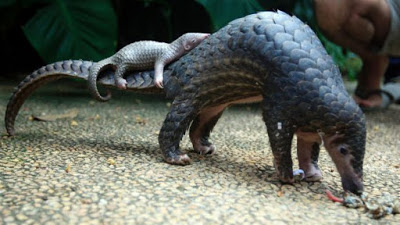A global trade ban has been imposed on trade in highly endangered pangolins, a scaly creature that is the world’s most poached mammal.
The pangolin, a mammal that looks like an anteater but has the tough scales of a crocodile, has long been prized in central Africa as a bushmeat delicacy.
But growing demand for it from Asia, where pangolin scales are used in Chinese medicine to help women lactate and to cure skin disorders, now threatens to hasten its demise and rob African countries of a precious resource.
Conservationists say the demand boom is due to declining wild populations in Asia as well as high numbers of Chinese workers in Africa’s resource and timber sectors, located in remote regions of the continent’s interior.
The example of Africa’s elephants, whose numbers have been slashed by demand from Asia for their ivory, have prompted conservations to mobilize to protect the pangolins.
Member states of the UN’s Convention on International Trade in Endangered Species, known as CITES, voted in Johannesburg on Wednesday to place the eight species of pangolin on the convention’s “Appendix I”, which prohibits any cross-border movement in the animals or their body parts for commercial purposes.
“Giving pangolins full protection under CITES will eliminate any question about legality of trade, making it harder for criminals to traffic them and increasing the consequences for those who do,” Ginette Hemley, of conservation group WWF, said.
Like other illicit wildlife commodity pipelines, such as elephant ivory and rhino horn, Africa is the main source of pangolin supply, while the demand comes from Asia.
Pangolin meat is prized as a delicacy in Asian economies such as Vietnam, while the animal’s scales, made of keratin, are used in traditional medicines.
Shy and near-sighted, pangolins only venture out from the safety of their burrows or tree-top homes at night to scour for insects.
When startled, they curl up into a ball – a technique that is futile against the cable snares set by hunters.
All eight of the world’s species of pangolin, which range from 30 to 100 centimetres length, are threatened with extinction.
Conservationists have said the demand boom stems from declining wild populations in Asia as well as high numbers of Chinese workers in Africa’s resource and timber sectors.
Only a few thousand remain in Morocco and Algeria and there is a feral population on the Rock of Gibraltar.
***
Source: Reuters




Dis one no concern us!
Good!
Bush meat! Sweet